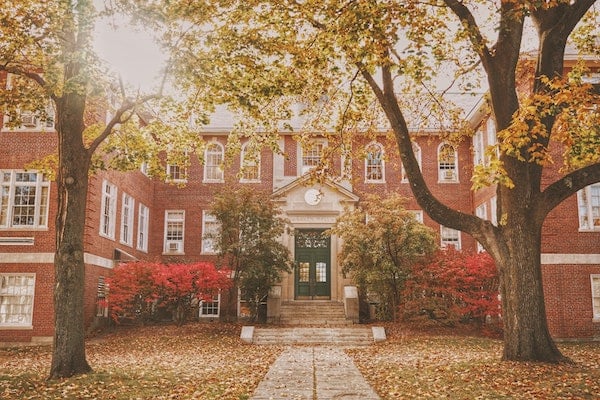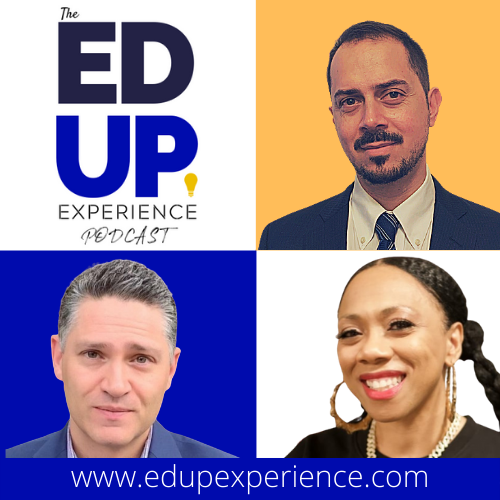Published on
Striving for HBCU Excellence

If the pandemic has shown higher ed anything, it’s the inequities among communities. It’s critical for institutions to focus on providing accessible education that provides equal opportunities to all learner demographics. In this interview, Dr. Joe Sallustio and Liz Leiba speak with Wayne Frederick to discuss marginalized communities, HBCUs and the importance of mentorship.
EdUp Experience: Howard University was reaccredited; what is the atmosphere among staff and on campus right now?
Wayne Frederick (WF): It’s a pretty involved process. We last did it in 2009, and we had a ten-year accreditation. So, our visit was supposed to be early in 2020. Because of the pandemic, that got changed to a virtual visit late in October. Our committee met recently and sent us a letter last week letting us know that we have full reaccreditation. So, it is an involved process. We put a team together a couple of years ago, and this is the conclusion of that, which is great.
EdUp Experience: As a doctor, can you weigh in on the passion that you have for marginalized communities, the concerns you have in terms of cancer outcomes and the initiatives you’ve been working on?
WF: This is an extremely important topic and one I’m passionate about. When you look at outcomes for so many cancers, they disproportionately impact Black people, and there are so many root causes for it. I’ve really tried to focus my career around closing that gap. The more I examine it, the more I see how wide that gap is. In Washington, DC, the life expectancy of a Black male living in Ward 7 or 8 is about 67 years. In Ward 3, the life expectancy of a white woman is almost 87 years. That’s a 20-year gap.
When we look at the social determinants of health in particular, access to proper healthcare, transportation, good nutritious meals—all of those things tend to be severely compromised in the Black community. So, what I’ve tried to work on is changing those things.
There are several things we must do. The pandemic has thrown this open, in terms of showing how wide those gaps are. And to be quite honest, the country overall will benefit if we lift those who currently benefit the least from those types of outcomes. So, we must spend some more time, energy and money in these areas.
EdUp Experience: Can you speak a little bit about the pandemic and the inequities and disparities that affect the Black community?
WF: Early on in the pandemic, testing was an issue. Now, that was a year ago, and now it seems like some of the things we were doing are almost archaic. To get a COVID test, you had to have a prescription from a referring physician, which was clearly not going to work for those in minority populations, or as you’re describing, marginalized populations.
What we did was set up a testing site in those neighborhoods and made it free and open to anyone who wanted to get tested, recognizing that people who may be working in close quarters were unduly exposed and did not have the ability in some circumstances to quarantine. Once it was clear that asymptomatic spread was a key factor, we knew that having them know their status was going to be helpful.
Now we’re focused on vaccine hesitancy. Obviously, some people are hesitant to get the vaccine because of mistrust. I see Howard as a trusted messenger in the community, so we’ve set up a vaccination center. We’ve been bringing people in in significant numbers. We’ve set up a PSA for people to see others getting the vaccine and talking about it. That’s something that we’re going to continue to do throughout this. But then as we go forward, those same inequities that have been exposed are inequities that we have to continue to address. So, Howard is going to continue bringing social justice issues forward and helping solve them.
EdUp Experience: How has Howard University, and HBCUs in general, served the Black community so well over the past hundreds of years?
WF: Howard University was founded on March 2nd, 1867, signed as the only federally chartered HBCU by the 17th president of the United States, President Johnson. He was also the first president to be impeached and was a known racist and misogynist—he was against the first reconstruction acts. Howard’s very birth was a paradox because while it was born out of giving freed slaves an opportunity to be educated.
We’re now training future presidents. We have our alum, Vice President Kamala Harris, in the White House. And that just goes to show you just what Howard is about. In between there, you have a 154-year history of a caravan on its way to social justice, picking up people along the way, giving them opportunities—people like Thurgood Marshall, Vernon Jordan, Elijah Cummings, Chadwick Boseman and Taraji P. Henson.
Howard has been about providing an opportunity to those who otherwise wouldn’t have it. We try to dip the African-American experience in Black excellence and make it clear that what we are about is uplifting the lack community, for the service of the entire society—and society is better when we diversify different industries. It’s better when we bring diverse voices to the table to discuss our larger American problems, and we’re trying to prepare the next generation to do that.
EdUp Experience: Now, HBCUs are being celebrated in a way we haven’t seen in the last 20 years. How does that feel and where does it come from?
WF: This is a complicated issue. Since I’ve been in this role, every time somebody poses that question to me, about whether HBCUs are relevant, I’ll tell them that the issue is not about relevancy but excellence. It’s about how can we ensure that these institutions are thriving because of how necessary they are to the fabric of American success. That is underscored by the fact that HBCUs represent only 3% of higher ed institutions but are responsible for about 22% of the bachelor’s degrees awarded to Black people. In STEM disciplines, it’s about 34%. We’ve graduated more Black physicians than anyone else in the country. And over the past couple of decades, we’ve sent more Black people to STEM PhDs than Stanford, MIT, Harvard and Yale combined.
The role that we play is not a small one. These are not institutions that are there because they’re a fad. They are an essential aspect of what is taking place in America today, so we have to make sure that they thrive. People have been made more aware of those outcomes, but those outcomes didn’t just start taking place last year or the year before. They’ve been around for over a hundred-and-something years. We’ve continued to produce that excellence.
It’s critical that we continue to push that narrative—that’s what I’ve done in this position. The reality is that if HBCUs didn’t exist today, we would have to go out and create them.
EdUp Experience: Do you think the reason for that is because there’s a large percentage of Black Americans who need to go to HBCUs that the rest of higher education may not be prepared to serve?
WF: We represent 3% of the higher ed institutions in the country, yet still we punch well above our weight. We’re responsible for one in five Black people getting their bachelor’s degrees. The number one supplier of African-Americans to the Harvard MBA program from their undergrad campus was Harvard. Number two was Howard University.
So, my point is that if they didn’t exist, the circumstance that we already have where Black Americans are well underrepresented would even be more dire, and we would be looking for a way to create these institutions. So, the fact that we have them means that we should embrace them and make sure that they’re thriving.
EdUp Experience: How do you go from surgeon to college president?
WF: There are a couple of things. One is, to be quite honest, I’m a reluctant university president. I don’t describe myself as a very ambitious person because I think ambition is about oneself. I like to see myself as an aspirational person, and aspiration is about trying to do better for others and aspiring to something, a higher calling. Howard gave me what no other institution in the world could have: not just an education to become an MD—Howard turned around and trained me to be a surgeon.
That experience I had is one that I am humbled to try to provide to others for. So, my role as president of Howard is really an attempt to pay back a debt of gratitude that I knew was be impossible to pay back. Becoming a surgeon and getting to the presidency was really a very unusual route. When I came back here, it was my first faculty position. I really tried to stay away from administrative roles, and that lasted about six months. Every time I would get another administrative role, people would see something else in me and would push me forward until I became the interim president quite by surprise, then subsequently the president. Similarities do exist in that, as a surgeon, one of the things that I live by is my mentor’s words. Dr. LaSalle Leffall said, “Equanimity under duress.”
When I’m in the operating room, something goes wrong, and the patient starts bleeding, I don’t get to yell and scream and stomp my feet. I have to focus on what’s going on and try to control it. So, being in a complex organization like this, something is always going to be going wrong. And I think that equanimity under duress is something I have learned to bring to the job, to pass on to my senior team and to really manage.
The last thing I’d say is there’s a big juxtaposition as well in the job. Being a cancer surgeon is probably the most rewarding job you can have. Patients and their families are very, very good to us—they express that gratitude. Being a university president is difficult. You have many different constituents, and nobody’s happy. So, I recognize that while this might be the most ungrateful job, being a cancer surgeon is a very grateful job. Fortunately, by the grace of God, I get to live in both worlds, and it’s very, very satisfying.
EdUp Experience: What is the importance of mentorship, and how we can, as a sector in higher education, work to incorporate mentorship more integrally across our college campuses?
WF: It’s such an important thing because ultimately, one of the things that helps people succeed is instilling confidence in them early and often. Mentorship is a two-way street. Especially with young black youth today, it is very important. And because there seems to be a generational divide, we fail to realize that young people want to be mentored. They actually want to hear from people they may think are old school.
Vernon Jordan did this the best of anybody that I’ve seen do it. He didn’t need to learn their music or dance to their songs. He brought what he had to bring to the table. One of the things that I will never forget is when Chadwick Boseman gave the commencement address, I had a dinner at my house Tuesday night to give him and his friends an opportunity to talk to some fellow alumni. But I also invited Vernon Jordan, and I have a picture of both of them talking intensely.
There’s so much more to our humanity that needs to be explored between the generations, and that should occur during mentorship. So, I urge all of us to play a role in trying to mentor that generation. And that doesn’t mean that we have to understand every single thing they do or that they need to understand every single thing about us. But the common thread of all humanity is what we should totally explore and amplify.
EdUp Experience: Is there anything about Howard you’d like to share and what do you see as the future of higher education?
WF: The future for higher education is bright. For a long time, as high education leaders, we’ve sat back and kind of given up on being leaders in our communities and our society. The pandemic has forced us to regain that and to really step up and step in. And there’s so much for us to contribute. If we step up, as we should, the future’s bright.
It’s also bright because I think young people are amazing. What young people have been through right now is going to prove very useful. There’s an African proverb that says, “Doesn’t matter how long the night is. Dawn will come.” These young people have seen a very dark moment in our history as a world and as a humanity.
What they will get from that is the interconnectedness. The fact that when they get an opportunity to attend a higher education institution, like Howard University, they must fulfill its motto of truth and service. And as we say, you don’t come here to get a degree; you come here to get an education, and it comes alive when you go out and serve others.
Listen to the full interview here.
This interview was edited for length and clarity.
Disclaimer: Embedded links in articles don’t represent author endorsement, but aim to provide readers with additional context and service.
Author Perspective: Administrator




